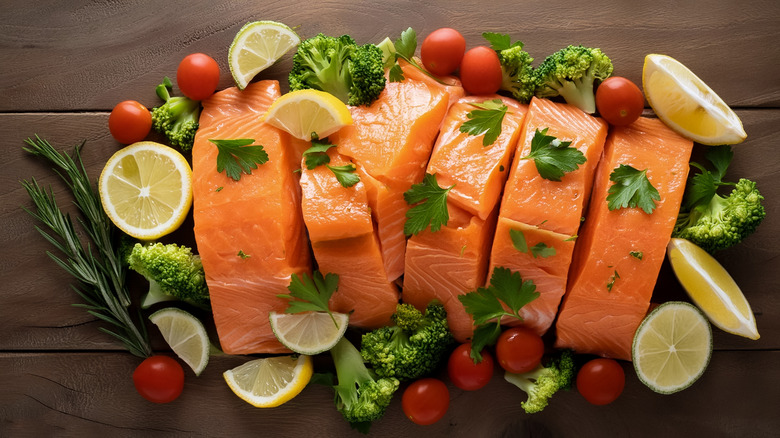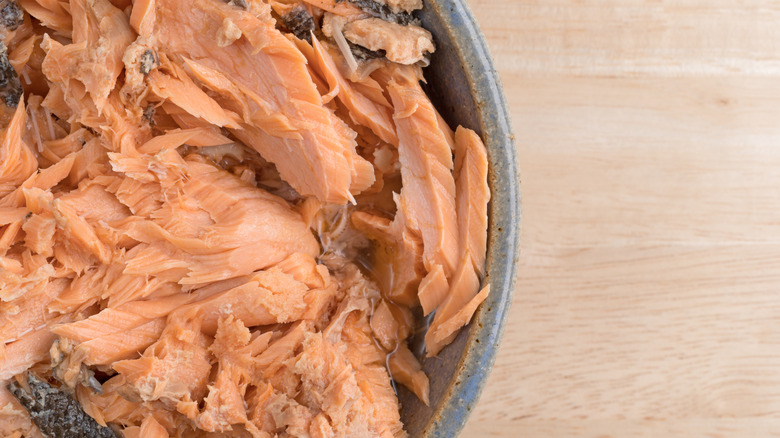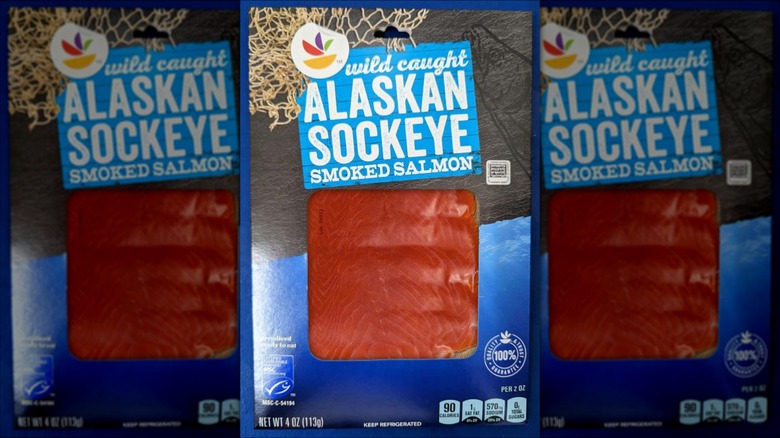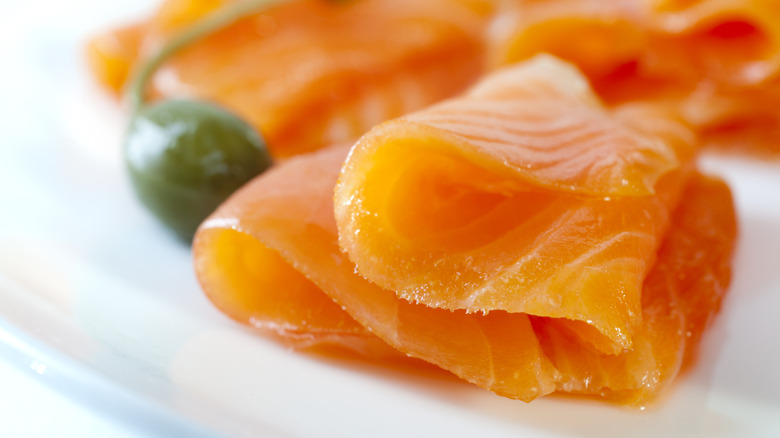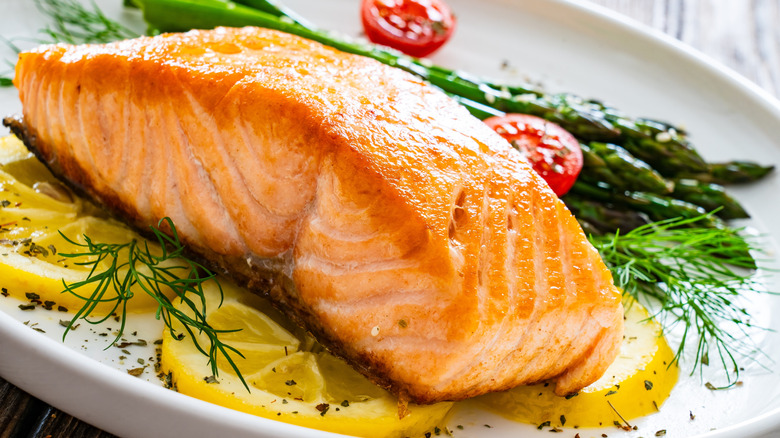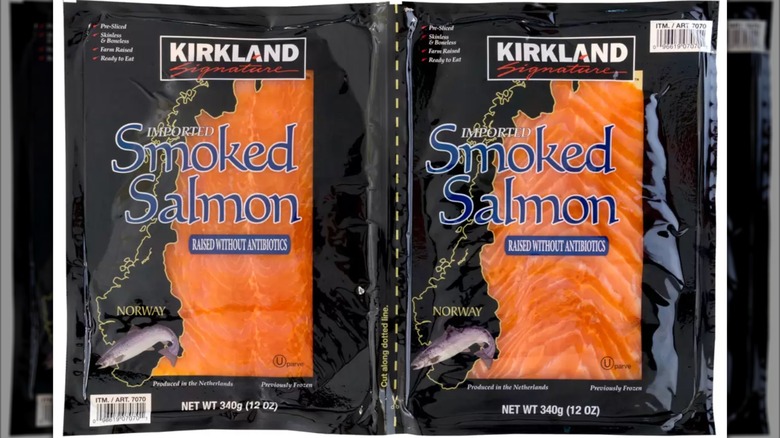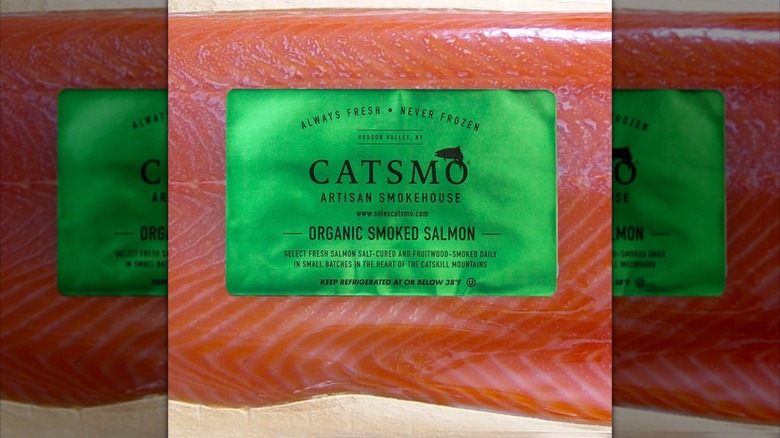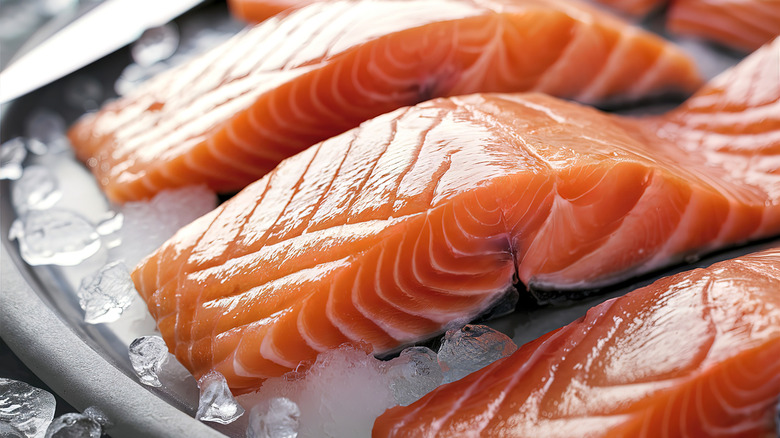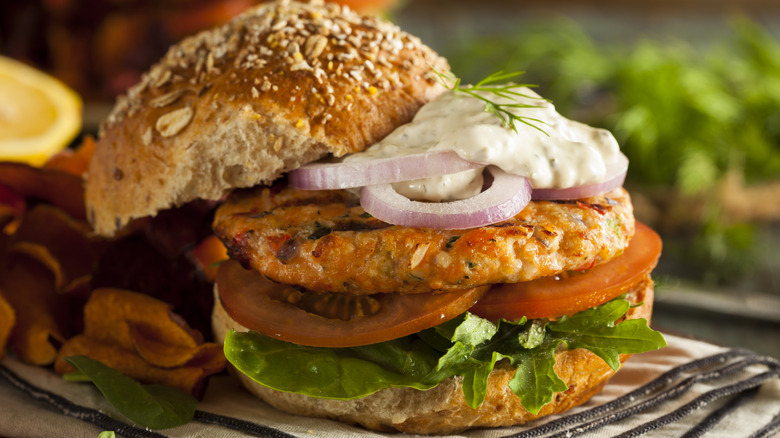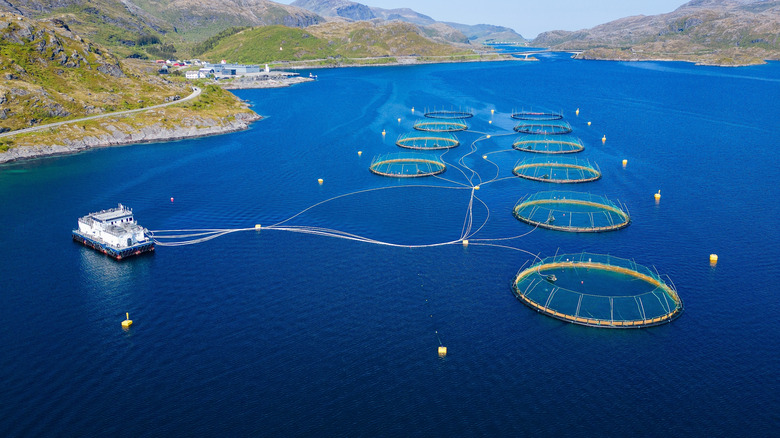13 Of The Worst Salmon Recalls In History
Millions upon millions of people enjoy salmon around the world as part of their diet, and as a result, millions upon millions of tons of the fish are caught and sold every year. With such a massive industry, it's hardly a surprise that things can go wrong now and again — and when they do, they usually happen on a big scale. Throughout history, there have been some absolutely huge salmon recalls that have involved an enormous quantity of products. Because salmon is enjoyed around the world, multiple countries have had to deal with their own recalls, but many of the biggest ones have taken place in the U.S.
Because salmon production is a multi-stage process, moving from water to land and then to our tables, there's a pretty diverse amount of things that can go wrong along the way. Contamination can occur while the fish is still growing, with pollutants making their way into the fish that could be harmful for humans to eat. Once the salmon starts to be handled, there's a heightened risk of cross-contamination, and for pathogens that cause food poisoning to make their way into the food. It's not just fresh salmon that's at risk, either. Processed and smoked salmon is also very prone to being unsafe to eat and to being recalled. Let's check out some of the biggest historical catastrophes.
1. A 1982 recall involved over 50 million cans of salmon
Because food production seems to grow every year, we tend to think of most major recalls occurring in modern times. That's not quite the case, and some historical food recalls have been absolutely enormous. Take the 1982 recall of canned salmon, for instance. This recall involved more than 50 million individual cans of salmon, and at the time was the second largest throughout all of U.S. history, after a much larger recall of canned mushrooms back in the 1970s.
Like that recall, the canned salmon recall was issued due to a can defect that resulted in botulism forming in one of its products. When an adult in Belgium consumed salmon from one of these cans and died from botulism poisoning, the multiple companies that were affected by the canning issue sprung into action. Apparently, the cans (which then went on to various different Alaskan canneries) had a defect that compromised the air seal, which then allowed botulinum toxins to grow inside them. A significant issue with this recall, and why it was so vast, was because the companies involved had to recall products made years before, thanks to the cans' extended shelf life. Luckily, this scare passed, and people could go back to upgrading their canned salmon.
2. Potential listeria contamination caused a large recall of smoked salmon in 2022
Folks can get a bit nervous around smoked salmon, which we get. Cold-smoked salmon is cured and smoked instead of being cooked at a higher temperature, and while its preparation process generally makes it safe to eat, it can still be prone to contamination. This was demonstrated in 2022, when a large quantity of smoked salmon had to be recalled due to Listeria concerns. Well over 500 cases of Alaskan Sockeye Smoked Salmon sold at Giant Food were recalled from stores in several states, at likely a pretty significant cost to Seven Seas International.
The potential Listeria contamination across the product line was discovered thanks to routine testing in Maryland, as opposed to anybody becoming ill from eating the fish. It's a good thing, too, as Listeria poisoning can result in significant health issues and some very nasty symptoms. Somewhat incredibly, only a few months later Seven Sea International had to issue another large recall of a different salmon product, again because of the potential for Listeria being present. This time, almost 300 cases of salmon sold at Publix had to be recalled. All the more reason to try homemade smoked salmon, huh?
3. Salmon sold by Marine Harvest had to be recalled from stores in over a dozen states
Because of the nature of modern food distribution chains, it's a lucky thing when recalls are limited to a small geographical area. More often than not, they span massive swathes of the country. This was the case in 2013, when a large amount of cold smoked salmon had to be recalled after being sold in the Midwest and across the East Coast, as well as in California. Salmon sold by Marine Harvest was recalled from 14 different states, and from stores in Puerto Rico, after Listeria monocytogenes were found in it.
If that wasn't complicated enough, the salmon was being sold under multiple different brand names. Nine different brands were implicated in the event, which no doubt caused them all a pretty big headache. Thousands of pounds of product had to be found and recalled. The recall was one of several recalls of smoked salmon products due to Listeria concerns that took place in 2013, which led to a higher sense of alert around consuming the food.
4. In 2021, a multi-state outbreak of salmonella took place, and salmon was a potential culprit
Despite its name, salmonella doesn't come from salmon, or really have anything to do with it. The bacteria is actually named after the veterinarian Daniel Salmon, who first isolated it back in the 1800s. However, salmonella is still entirely capable of contaminating the fish and causing some serious health scares, as well as some massive recalls. In 2021, one such recall took place after an outbreak of salmonella Thompson, a type of salmonella, which affected dozens of people. Well over 100 people became infected with the bacteria, and 20 people were hospitalized across over a dozen states.
The salmonella infections were eventually traced back to Northeast Seafood Products, a seafood distributor that sold several different salmon products, along with a host of other seafood items. These items were sold to various different food businesses in Colorado, which took the brunt of the illnesses, but they clearly traveled far and wide. Because the products were distributed over several months, Northeast Seafood Products had a lot of backlog to wade through and items to find. Thankfully, the outbreak eventually ceased, and no deaths occurred as a consequence of it.
5. Smoked salmon imported from the U.K. was the cause of a 1995 recall
Smoked salmon recalls are far from a new thing, y'all: They've been happening for decades. One such recall occurred back in 1995, and it involved a pretty big range of products. Salmon sold under six different brand names which were imported from the United Kingdom had to be recalled after several samples were found to contain Listeria monocytogenes. MacKnight, a company based in Pennsylvania, had distributed the salmon which was supplied by Glen Dawn Seafoods.
This salmon was distributed over a span of two and a half months, meaning that the amount of product it had to deal with was somewhat extensive. It also involved over a dozen batches of smoked salmon, making things more complicated.
Luckily, the recall seemed to pass without too much drama or consequence, but that wasn't the end of MacKnight's trouble. In 2003 it was involved in another recall, which involved almost 1,000 pounds of smoked salmon and trout. This recall was once again issued because of the risk of Listeria contamination within the products.
6. In the Netherlands, a huge outbreak of salmonella resulted in multiple deaths and a large recall
In 2012, perhaps the mother of all salmon recalls took place. It all began in August of that year, when officials in the Netherlands noticed that there was an uptick in salmonella cases across the country. This uptick soon exploded into a full-on crisis, with well over 1,000 individual cases of salmonella poisoning confirmed, and an estimated exposure of almost 6 million in the country to the pathogen. Eventually, four people died from the outbreak, which was linked back to smoked salmon made by Foppen, a company based in the Netherlands which was producing some of its products in a facility in Greece.
The facility was found to be using reusable dishes that had become contaminated with salmonella due to having a porous texture, with the bacteria seeping into the containers and affecting countless products. Naturally, an enormous recall occurred of Foppen's products, which wasn't just limited to the Netherlands. In the U.S., Costco had to issue an enormous recall notice to almost a quarter of a million customers who had bought Foppen smoked salmon sold in its stores. The good news for the American chain was that no illnesses were linked to its products, but the salmonella outbreak was (at the time) the largest ever seen in the Netherlands.
7. A large recall of various salmon products took place in 2019
At the end of 2019, the risk of Listeria contamination struck yet again — this time in the form of cold smoked salmon. Food company CATSMO LLC had to put out a large recall of its smoked salmon products after routine sampling conducted by the U.S. Food and Drug Administration found that Listeria monocytogenes were present in one of its items. The company decided to act quickly and widely, and hastily recalled a huge amount of its products from the market. Dozens of its salmon products had to be recalled in an attempt to catch the issue before it spiraled out of control.
CATSMO LLC wasn't helped by the fact that the salmon had been distributed to 11 different states, and many of the products had different expiration dates. The good news was that this recall didn't seem to produce any illnesses from Listeria itself. An investigation was subsequently conducted, and Listeria was found at the company's processing facility. The FDA ended up issuing the company a warning letter outlining the extensive ways that it had contravened standard health and safety practices, and informed it that it had to take appropriate action.
8. A massive recall took place in Denmark after a listeria scare
Smoked salmon is a popular fish choice in Denmark, as well as across the other countries in Scandinavia. So given the amount of product floating around, it's probably no surprise that things can go wrong on a fairly large scale. Danes had to avoid eating too much smoked salmon (or basically stop eating it entirely) back in 2017, when a large amount of smoked salmon had to be recalled by Dansk Supermarked, a large retail group in Denmark that operates multiple different chains.
Smoked salmon sold in the Salling, Bilka, Netto, and Føtex was recalled after the Danish Food Safety Authority found Listeria in the fish. It seems that this was a sweeping recall, and not just limited to one lot or sell-by date: All sizes and date markings for smoked salmon products had to be found and recalled, indicating a nationwide problem. In some ways, this makes the issue easier to deal with — but in other ways, it significantly heightens the risk to consumers. Each store operated by Dansk Supermarked had several different brand names of smoked salmon within them that had to be recalled, with the shelves being cleared of the fish until the problem was solved.
9. Salmon products sold over a period of six months had to be recalled due to botulism concerns
We tend to think of botulism toxins only affecting canned goods, but they can also grow and cause huge harm in other forms of food too. This was seen in 2019, when Sullivan Harbor Farm had to recall a large number of its products sold over a six-month period. Its cold smoked salmon products, which were sold in a variety of sizes, were packed in vacuum-sealed bags and shipped to a grand total of 23 states.
So, how did botulism affect this fish? Well, when tested, it was discovered that the salmon's water phase salt level was below 3.5%. Water phase salt essentially refers to how much salt is in the product relative to its weight, and if it drops below a certain level it can be a real issue. A higher salt level stops bacteria from growing, but when the water phase salt is too low it allows contaminants like botulism toxin to thrive. It wouldn't have been able to grow if the salmon had been packaged in another way, but because it was vacuum-sealed, the low-oxygen environment (which botulism requires) created the ideal space for it to multiply.
10. A large recall took place in the U.K. after fears of diesel contamination
You know what we don't want in our salmon? Diesel. It kinda seems reasonable enough to ask for, right? Sadly, in 2008 it seemed that salmon without diesel was quite difficult to achieve, in the U.K. at least. Supermarkets across the country had to recall their salmon items after they were apparently contaminated with the fuel product, with roughly 50 products having to be removed from the stores. In total, 10 supermarket chains were potentially housing the contaminated items.
How the diesel got into the salmon in the first place was a bit of a mystery, but the working theory was that a truck that was transporting the products to a processing plant may have been the cause. Amazingly, it didn't seem as though the salmon products were unsafe to eat, despite being contaminated with diesel. Nonetheless, they were still recalled because they had a pretty nasty taste. Oh, and also, because diesel shouldn't have been in them in the first place.
11. 10 months of smoked salmon shipments had to be recalled in 2016
Although food recalls are always pretty complicated, there's one thing in particular that can make them even more of a nightmare for producers and distributors: When the products affected are sold over a longer time period. One such example of this occurred in 2016, when New York-based company OLMA-XXI Inc. had to recall 10 months of shipments made of its smoked salmon. From December 2015 to October 2016, two different salmon products were shipped to various stores and warehouses, and all the while folks were none the wiser that it may have been contaminated with Listeria.
The potential contamination was discovered when the products were sampled as part of a routine process by the Florida Department of Agriculture and Consumer Services. The location points towards how far and wide these products traveled, again contributing to the Brooklyn-based company's headache. Incredibly, despite Listeria being found in the smoked salmon and the amount of time it had been on the market, nobody had reported becoming ill from eating it. That's a pretty lucky escape for your salmon and cream cheese bagels.
12. Undeclared sesame and milk caused a large recall of salmon burgers
Salmon is, of course, delicious on its own, but it's equally as delicious when it's made into salmon cakes or burgers. Unfortunately, this requires a degree of further processing which makes the product more likely to become contaminated or risky to eat, as more ingredients are introduced into the mix which can cause issues — especially when they're not announced. This occurred in 2023, when Raw SeaFoods, Inc. had to put out a recall notice for its Farm Raised Lightly Seasoned Atlantic Salmon Burgers. The burgers, which were sold in Whole Foods, contained both sesame and milk, two major allergens. However, these allergens weren't declared on the label.
This is, of course, a hugely risky situation. Sesame and milk allergies can produce incredibly dangerous, life-threatening symptoms, and when they're not declared on food products, things can go very wrong. What's even more amazing is that sesame wasn't declared despite the fact that sesame seeds were clearly visible on the burger itself. It's not super clear how this info was missed from the packaging, but unfortunately, Raw SeaFoods, Inc. had to deal with a recall of products sold over several months. We're willing to bet it checked the allergen label pretty carefully next time it put an item out.
13. In Canada, farmed salmon with a banned chemical had to be recalled
Many people prefer not to eat farmed salmon, partly due to the belief that it will contain a higher concentration of chemicals than its wild-caught alternative. This may not be entirely untrue, but generally speaking, we can expect farmed salmon to only contain substances that are approved for human consumption. In 2005, though, this wasn't the case, when a recall of farmed salmon was issued when it was found that traces of a banned chemical were found in it. Officials discovered that salmon supplied by Stolt Sea Farm in a British Columbia-based facility contained malachite green, a compound that was formerly used as a fungicide but was banned due to its potentially carcinogenic properties.
While the amount of malachite green in the salmon was low and didn't present a huge risk to consumers, the consequences that followed were big. First up was a recall that covered approximately 36,000 kilograms of fish, made more complicated by the fact that there wasn't a lot of clarity around how much was sold. A further 310,000 salmon at Stolt Sea Farm were deemed unusable. Stolt Sea Farm itself denied the use of malachite green, pointing instead towards the eggs it bought as the potential source. Despite this, the company was still investigatedand was ultimately cleared of any wrongdoing.
